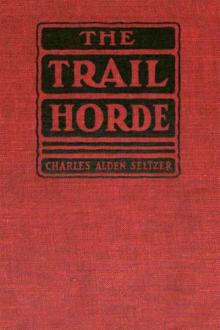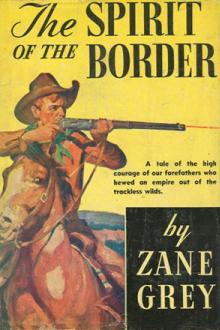The Border Legion, Zane Grey [books for 7th graders txt] 📗

- Author: Zane Grey
Book online «The Border Legion, Zane Grey [books for 7th graders txt] 📗». Author Zane Grey
Joan could not decide. She divined that there was antagonism between Gulden and all the others. And there was something else, vague and intangible, that might have been fear. Apparently Gulden was a criminal for the sake of crime. Joan regarded him with a growing terror—augmented the more because he alone kept eyes upon the corner where she was hidden—and she felt that compared with him the others, even Kells, of whose cold villainy she was assured, were but insignificant men of evil. She covered her head with a blanket to shut out sight of that shaggy, massive head and the great dark caves of eyes.
Thereupon Joan did not see or hear any more of the bandits. Evidently the conversation died down, or she, in the absorption of new thoughts, no longer heard. She relaxed, and suddenly seemed to quiver all over with the name she whispered to herself. “Jim! Jim! Oh, Jim!” And the last whisper was an inward sob. What he had done was terrible. It tortured her. She had not believed it in him. Yet, now she thought, how like him. All for her—in despair and spite—he had ruined himself. He would be killed out there in some drunken brawl, or, still worse, he would become a member of this bandit crew and drift into crime. That was a great blow to Joan—that the curse she had put upon him. How silly, false, and vain had been her coquetry, her indifference! She loved Jim Cleve. She had not known that when she started out to trail him, to fetch him back, but she knew it now. She ought to have known before.
The situation she had foreseen loomed dark and monstrous and terrible in prospect. Just to think of it made her body creep and shudder with cold terror. Yet there was that strange, inward, thrilling burn round her heart. Somewhere and soon she was coming face to face with this changed Jim Cleve—this boy who had become a reckless devil. What would he do? What could she do? Might he not despise her, scorn her, curse her, taking her at Kells's word, the wife of a bandit? But no! he would divine the truth in the flash of an eye. And then! She could not think what might happen, but it must mean blood-death. If he escaped Kells, how could he ever escape this Gulden—this huge vulture of prey?
Still, with the horror thick upon her, Joan could not wholly give up. The moment Jim Cleve's name and his ruin burst upon her ears, in the gossip of these bandits, she had become another girl—a girl wholly become a woman, and one with a driving passion to save if it cost her life. She lost her fear of Kells, of the others, of all except Gulden. He was not human, and instinctively she knew she could do nothing with him. She might influence the others, but never Gulden.
The torment in her brain eased then, and gradually she quieted down, with only a pang and a weight in her breast. The past seemed far away. The present was nothing. Only the future, that contained Jim Cleve, mattered to her. She would not have left the clutches of Kells, if at that moment she could have walked forth free and safe. She was going on to Cabin Gulch. And that thought was the last one in her weary mind as she dropped to sleep.
8
In three days—during which time Joan attended Kells as faithfully as if she were indeed his wife—he thought that he had gained sufficiently to undertake the journey to the main camp, Cabin Gulch. He was eager to get back there and imperious in his overruling of any opposition. The men could take turns at propping him in a saddle. So on the morning of the fourth day they packed for the ride.
During these few days Joan had verified her suspicion that Kells had two sides to his character; or it seemed, rather, that her presence developed a latent or a long-dead side. When she was with him, thereby distracting his attention, he was entirely different from what he was when his men surrounded him. Apparently he had no knowledge of this. He showed surprise and gratitude at Joan's kindness though never pity or compassion for her. That he had become infatuated with her Joan could no longer doubt. His strange eyes followed her; there was a dreamy light in them; he was mostly silent with her.
Before those few days had come to an end he had developed two things—a reluctance to let Joan leave his sight and an intolerance of the presence of the other men, particularly Gulden. Always Joan felt the eyes of these men upon her, mostly in unobtrusive glances, except Gulden's. The giant studied her with slow, cavernous stare, without curiosity or speculation or admiration. Evidently a woman was a new and strange creature to him and he was experiencing unfamiliar sensations. Whenever Joan accidentally met his gaze—for she avoided it as much as possible—she shuddered with sick memory of a story she had heard—how a huge and ferocious gorilla had stolen into an African village and run off with a white woman. She could not shake the memory. And it was this that made her kinder to Kells than otherwise would have been possible.
All Joan's faculties sharpened in this period. She felt her own development—the beginning of a bitter and hard education—an instinctive assimilation of all that nature taught its wild people and creatures, the first thing in elemental life—self-preservation. Parallel in her heart and mind ran a hopeless despair and a driving, unquenchable spirit. The former was fear, the latter love. She believed beyond a doubt that she had doomed herself along with Jim Cleve; she felt that she had the courage, the power, the love to save him, if not herself. And the reason that she did not falter and fail in this terrible situation was because her despair, great as it was, did not equal her love.
That morning, before being lifted upon his horse, Kells buckled on his gun-belt. The sheath and full round of shells and the gun made this belt a burden for a weak man. And so Red Pearce insisted. But Kells laughed in his face. The men, always excepting Gulden, were unfailing in kindness and care. Apparently they would have fought for Kells to the death. They were simple and direct in their rough feelings. But in Kells, Joan thought, was a character who was a product of this border wildness, yet one who could stand aloof from himself and see the possibilities, the unexpected, the meaning of that life. Kells knew that a man and yet another might show kindness and faithfulness one moment, but the very next, out of a manhood retrograded to the savage, out of the circumstance or chance, might respond to a primitive force far sundered from thought or reason, and rise to unbridled action. Joan divined that Kells buckled on his gun to be ready to protect her. But his men never dreamed his motive. Kells was a strong, bad man set among men like him, yet he was infinitely different because he had brains.
On the start of the journey Joan was instructed to ride before Kells and Pearce, who supported the leader in his saddle. The pack-drivers and Bate Wood and Frenchy rode ahead; Gulden held to the rear. And this order was preserved till noon, when the cavalcade halted for a rest in a shady, grassy, and well-watered nook. Kells was haggard, and his brow wet with clammy dew, and lined with pain. Yet he was cheerful and patient. Still he hurried the men through their tasks.





Comments (0)